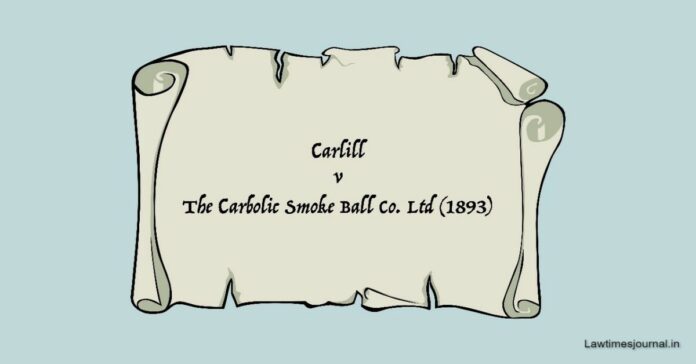
Court of Appeal [1893] 1 QB 256; [1892] EWCA Civ 1 Decided on 7th of December 1892 Bench: Justice Lindley; Justice Bowen; Justice Smith
Background
This judgment impacted English contract law. Especially the concept of Unilateral contract as now companies and advertising agencies are more careful with what they release to the world at large. A thoughtless marketing strategy can incur grave losses for the company as they may be pulled into an unnecessary litigatory matter.
Similarly, if the police offer rewards to the public at large if anyone provides information that will assist the police in a criminal investigation; then also such a scenario shall be treated as a unilateral contract. Thus, making the reward money payable.
Facts
The Defendant, the Carbolic Smoke Ball Company of London (Defendant), placed an advertisement in several newspapers on November 13, 1891, stating that its product, “The Carbolic Smoke Ball”, when used three times daily, for two weeks, would prevent colds and influenza. The makers of the smoke ball additionally offered a 100£ reward to anyone who caught influenza using their product, guaranteeing this reward by stating in their advertisement that they had deposited 1000£ in the bank as a show of their sincerity. The Plaintiff, Lilli Carlill (Plaintiff), bought a smoke ball and used it as directed. Several weeks after she began using the smoke ball, Plaintiff caught the flu.
Issue
There were 4 main issues raised:
- Whether there was any binding effect of the contract between the parties?
- Whether the contract in question required a formal notification of acceptance?
- Whether Mrs. Carlill was required to communicate her acceptance of the offer to the Carbolic Smoke Ball Company?
- Whether Mrs. Carlill provided any consideration in exchange for the reward of 100 pounds offered by the company?
Judgement
The Court of Appeal unanimously rejected the company’s arguments and held that there was a fully binding contract for £100 with Mrs. Carlill. Among the reasons given by the three judges were (1) that the advertisement was not a unilateral offer to all the world but an offer restricted to those who acted upon the terms contained in the advertisement (2) that satisfying conditions for using the smoke ball constituted acceptance of the offer (3) that purchasing or merely using the smoke ball constituted good consideration, because it was a distinct detriment incurred at the behest of the company and, furthermore, more people buying smoke balls by relying on the advertisement was a clear benefit to Carbolic (4) that the company’s claim that £1000 was deposited at the Alliance Bank showed the serious intention to be legally bound. The judgments of the court were as follows.
Concurrence
In the concurrences of Bowen L.J. and A.L. Smith, L.J., the notion of contractual consideration also becomes an issue of relevance. Both of these Judges note that while Defendant could argue lack of consideration, Plaintiff, in buying the Carbolic Smoke Ball and using it as directed, provided adequate consideration through the inconvenience she experienced by using the product.
Conclusion
This case stands for the proposition that while sales puffery in advertisements is generally not intended to create a contract with potential product buyers, in this case, it did because Defendant elevated their language to the level of a promise, by relying on their own sincerity.





